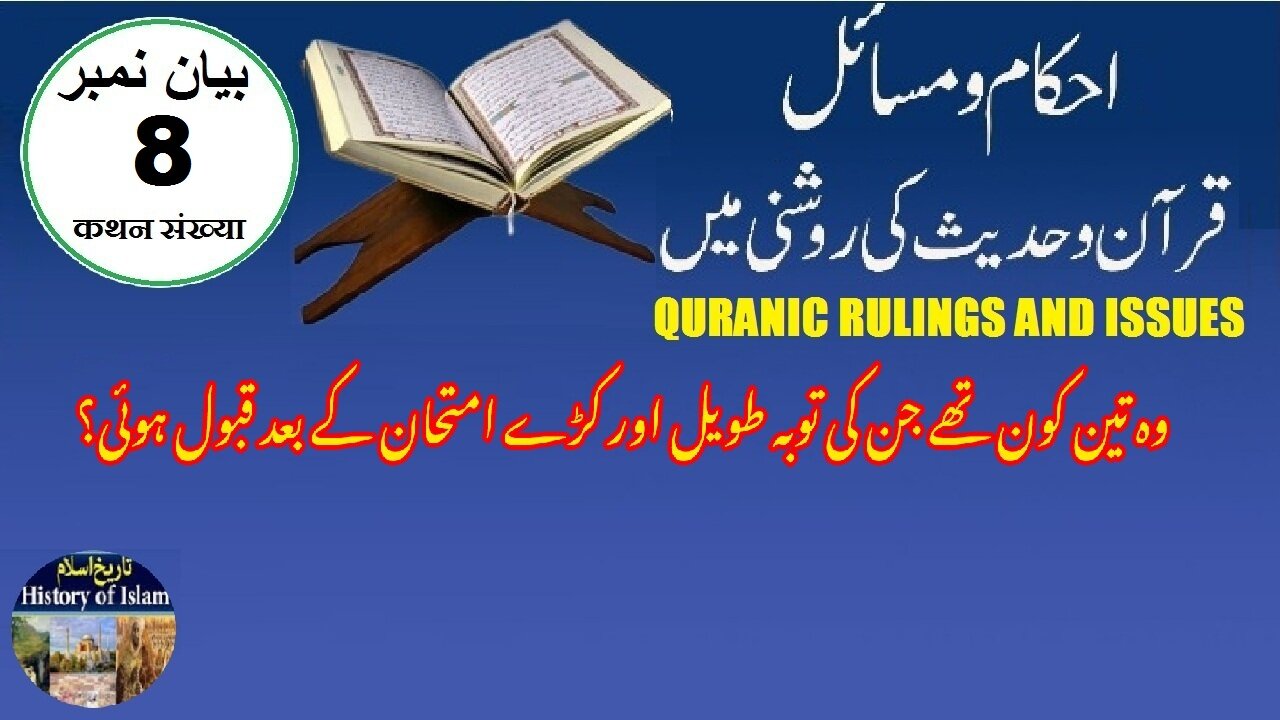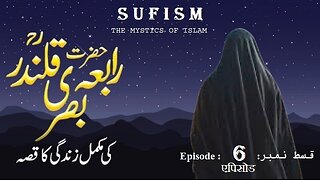Premium Only Content

Who were the three وہ تین کون تھے جن کی توبہ ایک طویل اور کڑے امتحان کے بعد قبول ہوئی؟
@islamichistory813 #whowerethe #three #whose #repentance #was #accepted #after #long #and #severe #test #islamicbayan #qurantafseer #hadithlessons #ilmdeen #quranwisdom #rozanabayan #sunnahteachings #imanibaatain #islamicknowledge #masailkaahal #quranstories
#deenreminder #hadithseikhtalat #islamicsolutions #ilmokhikmat
#dailybayan #sunnatseekhain #islamicevents #deenikahaniyan
#quranmessage #islamiclessons #islamiwaqiat #bayanseries #quranreminder #islamicwisdom
Who were the three whose repentance was accepted after long and severe test.
I begin in the name of Allah, the Most Gracious, the Most Merciful. Alhamdulillah, by the grace of Allah Almighty, we are beginning Statement No. 8. Our aim is to learn and teach from the Quran and Sunnah, understand the rulings, reflect on history, and seek solutions to problems with divine guidance. May Allah Almighty make this statement beneficial and a source of light for all hearts.
Today we will be describe, That Who were the three whose repentance was accepted after long and severe test.
In Surah At-Tawbah, Allah Almighty narrates the remarkable story of three companions whose repentance was accepted after a long and severe test. These men were Ka‘b ibn Malik, Hilal ibn Umayyah, and Murarah ibn Rabi‘, all of them sincere believers from among the Ansar of Madinah. Their story is directly mentioned in the Qur’an in Surah At-Tawbah verse 118:“And [He also forgave] the three who were left behind until, when the earth closed in on them despite its vastness and their souls became constricted, and they knew that there is no refuge from Allah except in Him, then He turned to them so they could repent. Indeed, Allah is the Accepter of repentance, the Merciful.” This verse not only records their names in the history of Islam but also provides a timeless lesson in sincerity, honesty, and the mercy of Allah.
The incident took place during the expedition of Tabuk in the ninth year after Hijrah, one of the most difficult campaigns faced by the Muslims. The journey was long, the heat was intense, and provisions were scarce. The hypocrites of Madinah began to present false excuses to avoid joining the Prophet (PBUH), but these three sincere companions delayed in preparing and eventually failed to accompany the Prophet (PBUH) despite having the means. When the Prophet (PBUH) returned from the campaign, those who had stayed behind came to him with fabricated justifications. However, these three men did not lie; they admitted their negligence openly. Ka‘b ibn Malik narrates in Sahih al-Bukhari Hadith No 4418 and Sahih Muslim Hadith No 2769 that he had wealth, strength, and no excuse except laziness. His truthfulness, although painful at the time, became the cause of his forgiveness.
Upon hearing their confessions, the Prophet (PBUH) ordered the believers to socially boycott them. This was not out of hatred but as a divine command to test the sincerity of their repentance. For fifty days, no one spoke to them, not even their closest relatives. Ka‘b ibn Malik describes that the earth felt narrow despite its vastness, and his heart was overwhelmed with grief. This description matches perfectly with Allah’s words in Surah At-Tawbah verse 118, where He says that the earth became constrained for them, though it is vast. Their state of isolation intensified to such an extent that even their wives were told to separate from them temporarily. Ka‘b narrates that during this period, he even received a letter from the king of Ghassan, inviting him to leave Islam and join him, but he immediately burnt it, demonstrating his loyalty to Allah and His Messenger ?.
After fifty nights of trial, Allah Almighty revealed verses declaring their repentance had been accepted. The Prophet (PBUH), who had been waiting for revelation, received the glad news and announced it to the community. Ka‘b ibn Malik recounts in Sahih al-Bukhari (Hadith 4418) that people rushed to congratulate him, and he hastened to the masjid to meet the Prophet (PBUH). The Prophet (PBUH), his face glowing with joy, told him: “Rejoice with the best day you have ever had since your mother gave birth to you.” This statement shows the immense value of Allah’s forgiveness and how repentance transforms the sinner into someone beloved to Allah.
This incident provides many lessons for believers. Firstly, it demonstrates the power of truthfulness. While hypocrites saved themselves temporarily through lies, these three companions faced humiliation but attained Allah’s eternal mercy. Allah emphasizes this in Surah At-Tawbah verse 119:“O you who believe! Fear Allah and be with those who are truthful.”* Secondly, it shows that repentance is not just a verbal act but often involves trials that purify the heart. Their repentance was delayed for fifty days, which served as a means of cleansing their souls. Thirdly, it highlights Allah’s boundless mercy. Despite their serious mistake of staying behind from jihad, Allah forgave them because of their honesty and deep remorse. This aligns with the hadith in Sunan Ibn Majah (Hadith 4251):“All the children of Adam commit sins, and the best of those who sin are those who repent.” Lastly, it proves that no matter how heavy one’s sins may feel, Allah’s door of forgiveness remains open for those who return with sincerity.
Therefore, the three whose repentance was accepted in Surah At-Tawbah were Ka‘b ibn Malik, Hilal ibn Umayyah, and Murarah ibn Rabi‘. Their story is one of the greatest examples in Islamic history of truthfulness, patience, and divine forgiveness. It stands as a reminder that even when the world feels constricted and despair overwhelms the heart, turning back to Allah with sincerity and honesty leads to mercy and relief. Indeed, Allah is At-Tawwab (The Accepter of Repentance) and Ar-Rahim (The Most Merciful).
We conclude today's discourse with this humble supplication: O Allah, purify our hearts, accept our deeds, forgive our sins, and include us among Your grateful servants. Bless us in our time, our families, and our faith, and gather us under the shade of Your mercy on the Day of Judgment. Amen
Allah Hafiz
=======================================
-
 10:20
10:20
ISLAMIC HISTORY
4 hours agoRabia Basri Episode No 6 | The Saint of Divine Love”| حضرت رابعہ بصری قسط نمبر6 | الہی محبت کا ولی
1 -
 LIVE
LIVE
Dr Disrespect
5 hours ago🔴LIVE - DR DISRESPECT - ARC RAIDERS - QUEST MASTER
2,237 watching -
 1:57:50
1:57:50
The Charlie Kirk Show
3 hours agoErika's Interview + Auburn Aftermath | Schlichter, Lomez | 11.6.2025
64.5K9 -
 1:02:01
1:02:01
Sean Unpaved
3 hours agoTragedy Strikes: Kneeland's Remembrance, Spo's Inferno, CFB HC Rumors, & TNF Raiders-Broncos' Odds
19.6K -
 1:01:46
1:01:46
Timcast
3 hours agoBannon RIPS GOP For Dismissing Zohran, "This Is Very Serious"
106K77 -
 2:12:18
2:12:18
Side Scrollers Podcast
4 hours agoSide Scrollers VTuber TAKE OVER with Kirsche, Rev Says Desu & DarlingStrawb | Side Scrollers
36.8K3 -
 LIVE
LIVE
StoneMountain64
2 hours agoArc Raiders is actually INCREDIBLE
106 watching -
 2:03:04
2:03:04
MattMorseTV
4 hours ago $0.74 earned🔴Trump’s EMERGENCY Oval Office ANNOUNCEMENT.🔴
58.3K64 -
 LIVE
LIVE
GrimmHollywood
5 hours ago🔴LIVE • GRIMM HOLLYWOOD and BIG TALL REDNECK • 3K 3XL TAKEDOWN • PGA • BF6 REDSEC • ARC RAIDERS
62 watching -
 3:11:27
3:11:27
Right Side Broadcasting Network
18 hours agoLIVE REPLAY: President Trump Makes an Announcement - 11/6/25
144K57